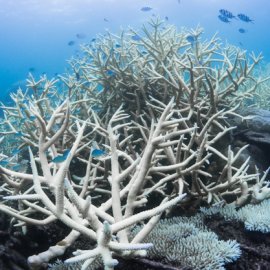Calculating Ocean Risk
-
English
-
ListenPause
[intro music, ocean sounds]
Welcome to World Ocean Radio…
I’m Peter Neill, Founder of the World Ocean Observatory.
“Calculating Ocean Risk,” an August 2025 article by Back to Blue, an initiative of The Economist Impact and the Nippon Foundation, begins with this declaration: “Climate change has been one the greatest failures of risk management in modern history.” Backed by intense, comprehensive measurement by government and financial institutions worldwide, the authors continue, “The scientific evidence had been clear for decades, but decision-makers have failed to act in a manner consistent with the scale of the risk….The economic stakes are enormous: in a worst case scenario, the world could see a 50% loss in GDP between 2070 and 2090.”
Anyone aware of climate-related policy changes made by the US Government in the past six months will know that any progress in train over last decades have been confronted with political regress: the cancellation of policies, regulations, alternative energy research, wind and solar installations, even mid-construction, international agreements and standards, pledged public and private investments, and augmentation of incentives to reverse any climate applied solution in favor of its opposite. Private banks, corporations, independent finance managers, pension funds, insurance companies have all reversed their climate programs to a regressive vector of values, structures, and behaviors that have been the well-documented, publicly recognized original cause of the climate challenge. What has taken years to change and register new measurable success has been eradicated, at least in the United States, by strokes of a pen, enabling a return toward self-inflicted catastrophe.
The calculation of risk to the ocean and its impact on all aspect of the global economy has been underway for a comparable period. Risk managers have created systems for monetization of estimated damage across a full spectrum of societal consequence, with budgets projected on realistic models and estimates that capture the inter-related consequence of system-linked change. Those budgets are benchmarks no longer in play for analysis of what has been termed “planetary solvency,” the financial capacity to meet long-term obligations.
The authors focus on ocean acidification, the changing pH of the ocean, estimating its ongoing impact, especially its potential to disrupt food supplies for billions of people worldwide, as no longer relevant, even as heatwaves, ocean temperature increase, ocean circulation shifts, and dramatic meteorological change continue to exacerbate and accelerate natural, public health, social conflict, and human justice outcomes worldwide.
In 2025, a Planetary Solvency Risk Platform was developed to model scenarios of consequence from limited to extreme, quantified by indicators to include percentage of GDP loss, cost or lack of adequate insurance compensation and repair, property devaluation, increased human mortality, depleted natural resource extraction, and irremediable loss of ecosystem service in support of human survival. “Entire regions,” they surmise, “may be uninsurable in the near future, putting other financial services at risk as well, with experts warning that the entire global financial services at risk may be unable to adjust.”
What is happening here? Why are we denying the evidence of decades of science? Why are we accepting predictable catastrophe as policy and re-action embraced and promoted to no global profit to be gained? Why are managers charged with protections for the future ignoring the data to promote predictable financial and social decline? Why would we choose to corrupt the natural systems that are the only true elements in any calculation of a future plan? Why are we ignoring what the ocean is telling us through its pervasive connection to our well-being, across all aspects of place and time? Why is this happening? And how do we say stop to a process that denies the sustainability of the ocean for the benefit of all mankind?
We will discuss these issues, and more, in future editions of World Ocean Radio.
WORLD OCEAN RADIO IS DISTRIBUTED BY THE PUBLIC RADIO EXCHANGE AND THE PACIFICA NETWORK, FOR USE BY COLLEGE AND COMMUNITY RADIO STATIONS WORLDWIDE. FIND US WHEREVER YOU LISTEN TO PODCASTS, AND AT WORLD OCEAN OBSERVATORY DOT ORG, WHERE THE FULL CATALOG OF MORE THAN 700 RADIO EPISODES IS SEARCHABLE BY THEME.
[outro music, ocean sounds]
“Climate change has been one the greatest failures of risk management in modern history.” So states the Back to Blue Initiative, an Economist and Nippon Foundation project. A recent article entitled "Calculating Ocean Risk," additionally states: “The scientific evidence had been clear for decades, but decision-makers have failed to act in a manner consistent with the scale of the risk.” This week on World Ocean Radio we are discussing the calculation of risk to the ocean, and its impact on all aspect of the global economy.
About World Ocean Radio
World Ocean Radio is a weekly series of five-minute audio essays available for syndicated use at no cost by college and community radio stations worldwide. Peter Neill, Founder of the World Ocean Observatory and host of World Ocean Radio, provides coverage of a broad spectrum of ocean issues from science and education to advocacy and exemplary projects.
World Ocean Radio
15 Years, 760+ Episodes
Ocean is climate
Climate is ocean
The sea connects all things
- Login to post comments



